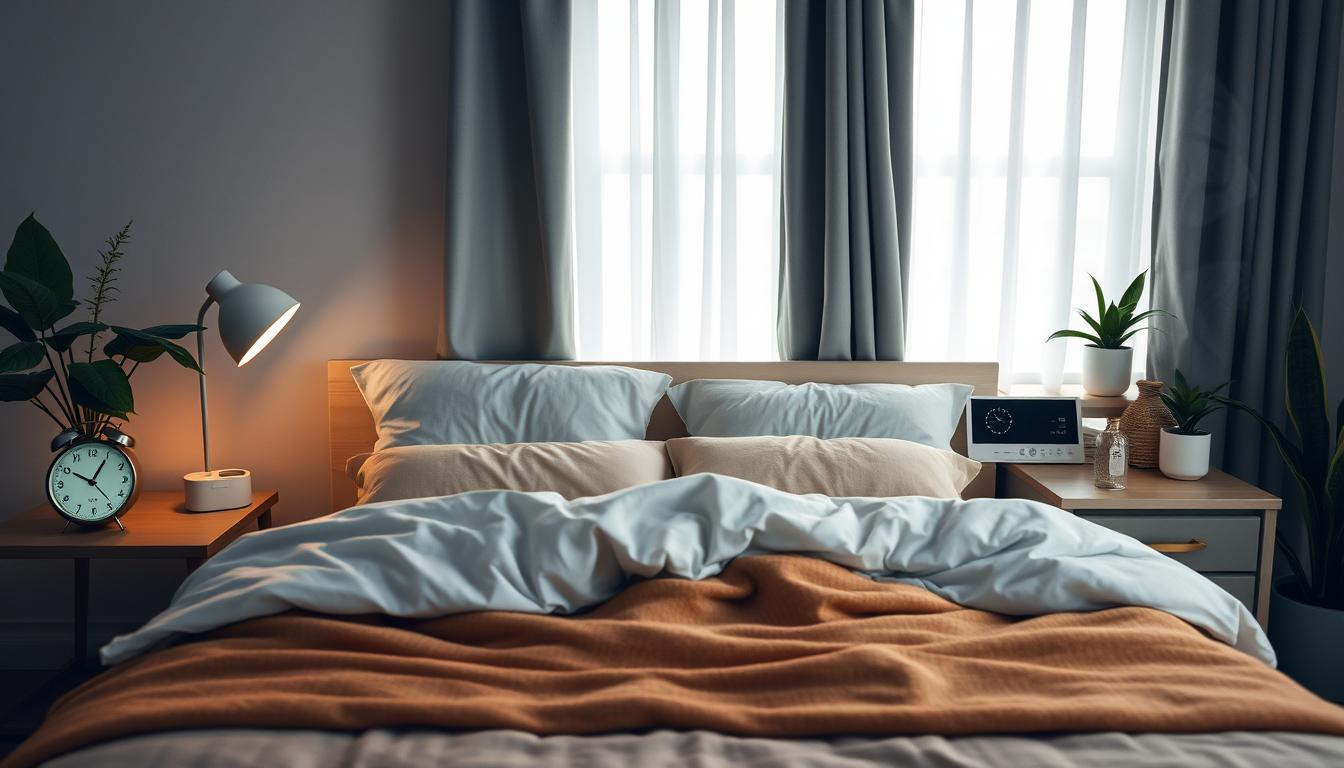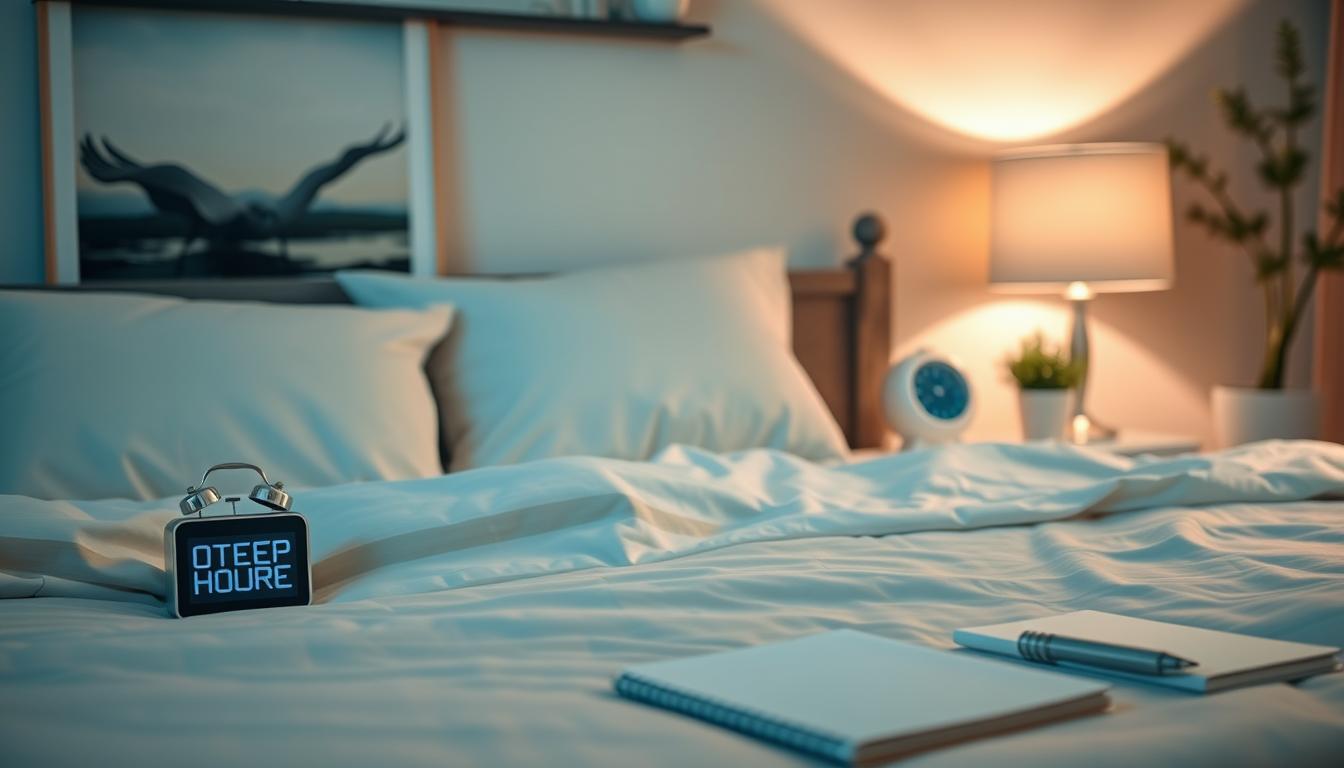Last Updated on December 9, 2025
Sleep is not just a luxury; it’s crucial for peak productivity in daily life. Many overlook its importance, choosing tasks over rest. Research indicates adults need at least seven hours of quality sleep nightly to excel. By prioritizing sleep, cognitive abilities, creativity, and emotional stability improve, all key for peak productivity.
Not getting enough sleep leads to fatigue, poor focus, and lower work performance. With nearly a third of Americans not meeting sleep guidelines, it’s clear how vital sleep is for maintaining productivity and well-being.
Key Takeaways
- Inadequate sleep negatively impacts cognitive function and work performance.
- Many Americans do not get the recommended seven hours of sleep.
- Long-term sleep deprivation raises the risk of obesity and cognitive decline.
- Employers suffer financially from employees’ fatigue and reduced productivity.
- Understanding sleep’s link to workplace performance is key to better outcomes.
- Healthy sleep habits can significantly boost your life quality.
- Creating sleep-friendly workplaces boosts employee satisfaction and performance.
Understanding the Relationship Between Sleep and Productivity
Grasping the connection between sleep and productivity is crucial for boosting your work output. Not getting enough sleep can severely limit your peak performance. Studies show that around 45 percent of adults lack sufficient sleep, leading to a decline in daily productivity. This deficiency can result in slower reflexes and poorer decision-making, which hinders your work efficiency.
Alarmingly, nearly 30 percent of American workers log less than six hours of sleep nightly. This number surges to over 40 percent among managers and entrepreneurs. Such habits not only affect individual performance but also the overall efficiency of the workplace. Research links poor sleep quality to lower job satisfaction, increased turnover intentions, and negative workplace sentiments.
Sleep issues are a worldwide concern affecting workplace productivity. In China, 37.8 percent of employees struggle with sleep disorders that hinder their daytime productivity. Sleep disorders have been declared a public health epidemic by the U.S. Centers for Disease Control and Prevention.
Recognizing how your sleep habits affect your daily tasks empowers you to make significant changes. Quality sleep boosts motivation and energy, preparing you to face challenges with confidence. Reflect on your sleep patterns and their impact on your work performance.

How Sleep Affects Your Work Performance
Adequate sleep is often overlooked, yet it’s crucial for boosting your work performance. Getting enough rest enhances your productivity and sharpens your thinking and creativity. Studies show that those sleeping less than seven hours a night may lose up to 19% of their productivity. Quality sleep impacts not just immediate tasks but also helps with organization and time management.
Not getting enough sleep can hinder your decision-making and increase errors. This not only affects daily tasks but can also slow down your career growth. Insufficient sleep is linked to health issues like obesity and type 2 diabetes, which further impair work performance. The link between sleep and productivity highlights the need for better sleep to maintain top work performance.
- Shorter sleep duration correlates with an increased risk of health complications.
- Sleep deprivation can lead to heightened fatigue, affecting focus and creativity.
- Good sleep habits contribute to better engagement in job-related tasks.
Improving sleep can start a positive cycle. Better sleep quality often leads to better work performance, creating a more balanced life. Understanding sleep’s impact on work can motivate you to adopt better sleep habits.
The Effects of Sleep Deprivation on Cognitive Function
Sleep deprivation significantly impacts effects on cognitive function, making daily tasks challenging. Not getting enough rest slows down brain processes, affecting memory and attention. This can lead to difficulties in remembering information and focusing.
Research indicates that a single night without sleep can disrupt how your brain handles attention. Longer periods without sleep further affect your alertness. After 24 hours of no sleep, cognitive performance and brain activity decline significantly. This decline can make you feel as impaired as being under the influence, impacting your decision-making abilities.
Memory encoding also takes a hit from lack of sleep. With several nights of reduced sleep, remembering information becomes harder. Creative problem-solving becomes an uphill task, significantly impacting work performance. For those in the workforce, this can be a major productivity hurdle.
Learning productivity tips is key to overcoming these hurdles. Ensuring quality sleep enhances memory and spatial working memory. Studies confirm that sleep is vital for cognitive enhancement, aiding in learning and applying new skills at work.

Sleep Deprivation Effects on Mood and Motivation
Lack of adequate sleep significantly impacts mood changes and overall emotional well-being. Those who don’t get enough sleep often feel more irritable, stressed, and anxious. These symptoms can make it hard to stay motivated, affecting daily tasks and the enjoyment of activities you once loved. Studies underscore the critical role of quality sleep in stabilizing mood and promoting emotional health.
When you get a good night’s rest, you’re better equipped to face challenges positively. But not getting enough sleep can lead to emotional burnout, reducing your motivation and ability to meet goals. It’s vital to understand the importance of maintaining a healthy sleep schedule to dodge the negative effects of sleep deprivation.

Getting 7-9 hours of sleep each night can also boost your academic performance, especially for college students. However, early morning classes can disrupt sleep patterns, exacerbating sleep deprivation effects. With millions of adults not getting enough sleep, the link between sleep, mood, and motivation is crucial for daily life.
Adopting good sleep habits, like a consistent bedtime routine and effective morning routines, can greatly improve your emotional resilience and motivation. Prioritizing sleep quality is key to maintaining emotional well-being and enhancing daily performance.
Sleep and Productivity: The Economic Impact
The economic impact of sleep deprivation is a major concern for many organizations. Over a third of American adults lack sufficient sleep, leading to significant productivity losses. These losses due to sleep deprivation amount to billions annually. In schools, more than 87 percent of students fail to meet sleep recommendations, affecting their academic performance and future earnings.
Workplace accidents are a major issue, with nearly 20 percent of serious crashes caused by driver drowsiness. Moreover, those dealing with high BMI, smoking, or financial stress tend to have worse sleep quality. For example, overweight individuals sleep 2.5 to 7 minutes less than those at a healthy weight, and smokers lose about 5 minutes of sleep daily.
The financial burden of sleep disorders is immense, with hundreds of billions spent yearly on medical treatments. These treatments include doctor visits, hospital services, and medications. Sleep loss and related disorders impair performance in various areas, affecting attention, memory, and decision-making skills.
Organizations can address these issues by implementing wellness programs to improve employee sleep quality. Such initiatives can reduce the economic impact of sleep deprivation while boosting morale and productivity at work.
Improving Your Sleep Quality for Better Productivity
Mastering your sleep hygiene is crucial for boosting productivity. It begins with understanding your sleep patterns. Recognizing these patterns lets you make changes for a healthier sleep cycle.
Assessing Your Sleep Habits
Begin by keeping a sleep diary to monitor your rest. Record when you go to bed and wake up, and note any disturbances. Consider how stress or caffeine might impact your sleep. Regularly reviewing your sleep habits helps pinpoint areas for improvement, leading to better sleep quality.
Creating a Healthy Sleep Routine
Consistency is key for restful sleep. Stick to a regular sleep schedule, even on weekends. Before bed, engage in calming activities like reading or stretching to unwind. Ensure your bedroom is dark and cool to foster sleep. A healthy sleep routine prepares you for increased alertness and productivity daily.

Practical Tips to Enhance Sleep Quality
Your sleep environment significantly impacts your sleep quality. Light, temperature, and noise can disrupt your rest. By making simple changes, you can turn your sleeping area into a haven for relaxation.
Optimizing Your Sleep Environment
To make your space ideal for sleep, consider these strategies:
- Use blackout curtains or shades to keep your bedroom dark.
- Keep the room cool, aiming for a temperature of 65 to 68 degrees Fahrenheit.
- Use earplugs or a white noise machine to block out noise.
- Add calming scents like lavender to help you relax and sleep better.
- Choose a comfortable mattress and pillow to prevent pain and ensure restful sleep.
Optimizing your environment sets the stage for restful nights, enhancing your productivity the next day. Simple cues, like dimming lights before bed or cutting down on screen time, signal your body to unwind.
Importance of Sleep Tracking Devices
Sleep tracking devices provide insights into your sleep patterns, helping you pinpoint areas for improvement. With this data, you can refine your habits for better sleep. Keeping a sleep journal tracks these changes over time.
Wearable tech from brands like Fitbit or Oura Ring tracks sleep duration and quality. Using sleep tracking devices in your routine empowers you to manage your sleep hygiene. This proactive strategy leads to better sleep habits and boosts your health, laying a solid foundation for productivity.

Conclusion
Understanding the role of sleep is crucial for boosting your productivity and overall health. Sleep deprivation affects not just your performance but also the workplace and the economy. By valuing good sleep, you can reduce stress, improve social skills, and maintain focus all day.
Effective sleep strategies can revolutionize your work life. Quality sleep enhances your cognitive and emotional strength, enabling you to manage stress and challenges better. This leads to a healthier work environment, fostering teamwork and collaboration.
Adopting good sleep practices and using practical advice can help create a sleep-friendly environment. Your dedication to improving sleep will unlock your full potential, enabling you to excel in both your career and personal life in today’s fast-paced world.







